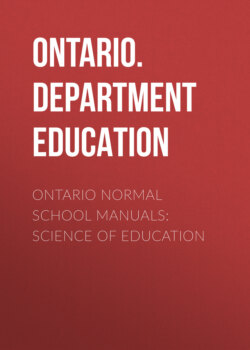Читать книгу Ontario Normal School Manuals: Science of Education - Ontario. Department of Education - Страница 16
На сайте Литреса книга снята с продажи.
INFLUENCE OF CONSCIOUS REACTION
ОглавлениеTable of Contents
A. On Instinctive Action.—Before concluding our survey of the various forms of reaction, it may be noted that both instinctive and habitual action are subject to the influence of conscious reaction. As a child's early instinctive acts develop into fixed habits, his growing knowledge aids in making these habits intelligent and effective. Consciousness evidently aids, for example, in developing the instinctive movements of the legs into the rhythmic habitual movements of walking, and those of the hands into the later habits of holding the spoon, knife, cup, etc. Greater still would be the influence of consciousness in developing the crude instinct of self-preservation into the habitual reactions of the spearman or boxer. In general, therefore, instinctive tendencies in man are subject to intelligent training, and may thereby be moulded into effective habits of reaction.
B. On Habitual Action.—Further new habits may be established and old ones improved under the direction of conscious reaction. When a child first learns to represent the number four by the symbol, the problem is necessarily met at first through a conscious adjustment. In other words, the child must mentally associate into a single new experience the number idea and certain ideas of form and of muscular movement. Although, however, the child is conscious of all of these factors when he first attempts to give expression to this experience, it is clear that very soon the expressive act of writing the number is carried on without any conscious direction of the process. In other words, the child soon acquires the habit of performing the act spontaneously, or without direction from the mind. Inversely, any habitual mode of action, in whatever way established, may, if we possess the necessary experience, be represented in idea and be accepted or corrected accordingly. A person, for instance, who has acquired the necessary knowledge of the laws of hygiene, may represent ideally both his own and the proper manner of standing, sitting, reclining, etc., and seek to modify his present habits accordingly. The whole question of the relation of conscious to habitual reaction will, however, be considered in Chapter XXII.
